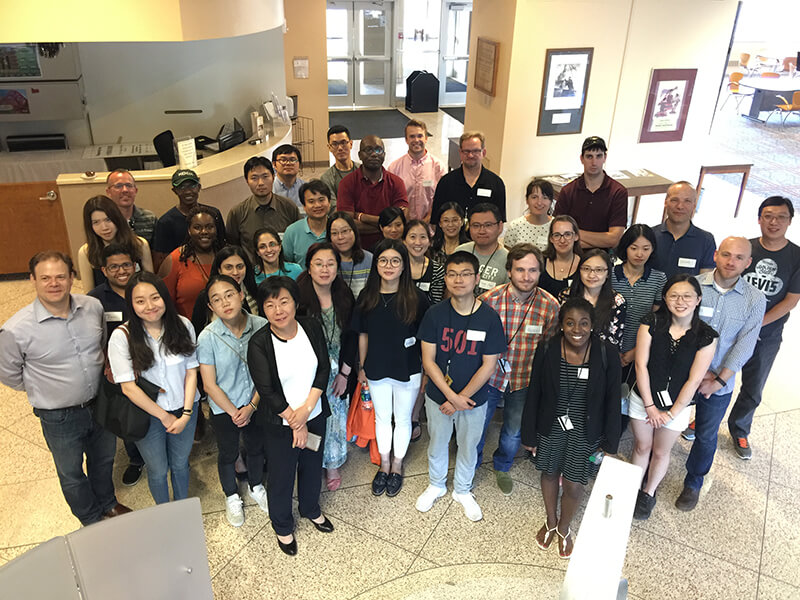June 18, 2018
Short course on biomedical big data invites researchers to featured lectures
 Attendees, instructors, speakers, teaching assistants and volunteers from the Big Data Training for Translational Omics Research boot camp. (Photo by Sarah Sellke)
Download image
Attendees, instructors, speakers, teaching assistants and volunteers from the Big Data Training for Translational Omics Research boot camp. (Photo by Sarah Sellke)
Download image
Several lectures in the third annual Big Data Training for Translational Omics Research boot camp, meeting June 15-24 on Purdue's West Lafayette campus are open to all Purdue researchers. The boot camp provides biomedical researchers inexperienced in biomedical big data science with entry-level training in big data science.
The boot camp is organized by Min Zhang, professor of statistics in the College of Science, along with core members of her BigTap Team -- James C. Fleet, Distinguished Professor of Nutrition Science; Pete Pascuzzi, assistant professor of biochemistry and assistant professor of libraries; and Wanqing Liu, associate professor at Wayne State University. Fleet, Pascuzzi and Liu will teach a series of classes in this 10-day intensive boot camp.
The goals of the boot camp are to raise participant awareness and knowledge of the value of big data in biomedical research, build basic competency of participants in the use of established tools and public databases, and give participants a vocabulary that allows them to communicate effectively with big data science experts.
The boot camp will use a series of problem-based activities to build familiarity and basic competency with established tools and publicly available resources. The boot camp will involve hands-on work, case studies and formal lectures from experts. It will guide participants through the type of research questions that can be asked of big data and where to access available tools to interface with the data. The boot camp uses high performance computing and is group project-driven.
Topics covered include using public databases and tools; differential expression analysis using microarray and RNA-seq data; use of Next Generation Sequencing data for RNA-seq, ChIP-seq and epigenetics; visualization and functional assessment of data; use of ‘omics’ data for Biomarker discovery, integrating multiple types of omics data and building an understanding of GWAS and how genetic variation influences biology and disease.Lectures at the boot camp that are open to Purdue researchers are scheduled for the following times in Rawls Hall, Room 1057:
* Monday (June 18): “Introduction to Machine Learning in Biomedicine,” by Sean Davis, senior associate scientist at the National Cancer Institute. 1-2:30 p.m.
* Tuesday (June 19): “Imaging-based Markers for Disease: Radiomics and Radiogenomics,” by Constantine Gatsonis, the Henry Ledyard Goddard professor of biostatistics at professor of biostatistics and director of statistical sciences at Brown University. 10:15 a.m.-noon.
* Wednesday (June 20): “Diversity, Composition and Dynamics in Microbiome Association Studies,” by Hongzhe Li, professor of biostatistics in biostatistics and epidemiology at the University of Pennsylvania Perelman School of Medicine. 1-2:30 p.m.
* Thursday (June 21): “Practical Advice in Bioinformatics,” by Nadia Atallah, bioinformatician at Purdue University Center for Cancer Research. 2-3:15 p.m.
* Friday (June 22): “Squeezing More Information from the Medical Phenome: New Methods for Discovery,” by Nancy Cox, director of the Vanderbilt Genetics Institute. 1-2:30 p.m.
Additional details about the lectures are available online.
Thirty participants including medical doctors, professors, postdoc researchers and graduate students will participate in the boot camp. The funding for the boot camp is provided by the NIH Big Data to Knowledge program to increase the use of big data by biomedical researchers and to advance understanding of human health and disease.
This boot camp pushes toward Purdue’s Integrative Data Science Initiative, which is focused on applying data science research to pressing fundamental and socially relevant issues while establishing a “data science for all” educational ecosystem of data fluency to prepare students for the rapidly expanding future of a data-driven, knowledge economy. IDSI adds another major goal to the university-wide Purdue Moves initiative, which was launched in 2013 to strengthen and expand the University’s preeminent reputation in science, technology, engineering and mathematics.
More information about the boot camp can be found here.
Writer: Kelsey Schnieders Lefever, kschnied@purdue.edu
Source: Sarah Sellke, coordinator of big data training and continuing lecturer in statistics, ssellke@purdue.edu

